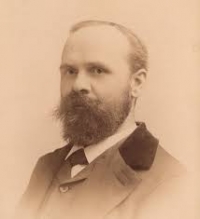Latest Sheet Music
Giuseppe Donizetti
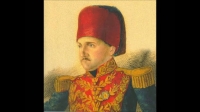
Giuseppe Donizetti. Italian musician. Turkey in the 19th century who introduced the first in Turkey and western music band which Mûsikâ-i Humayun's development is the person who provided the largest contribution
Michael Jackson

Michael Joseph Jackson (August 29, 1958 – June 25, 2009) was an American singer, dancer and entertainer. Referred to as the King of Pop, he is the most commercially successful entertainer of all time, and one of the most influential. His contributions to music, dance and fashion, along with a much publicized personal life, made him a global figure in popular culture for over four decades.
Alongside his brothers, he made his debut as lead singer and youngest member of The Jackson 5 in 1964. He began his solo career in 1971. His 1982 album Thriller remains the best-selling album ever, with Off the Wall (1979), Bad (1987), Dangerous (1991) and HIStory (1995) also among the world's best-selling albums. He is widely credited with having transformed the music video from a promotional tool into an art form with videos for his songs such as "Billie Jean", "Beat It" and "Thriller" making him the first African American artist to amass a strong crossover following on MTV. With stage performances and music videos, Jackson popularized a number of physically complicated dance techniques, such as the robot and the moonwalk. His distinctive musical sound, vocal style, and choreography, is credited with stretching across and breaking down cultural, racial, economic, generational, and global barriers that has inspired countless pop, rock, R&B and hip hop artists.
One of the few artists to have been inducted into the Rock and Roll Hall of Fame twice, his other achievements feature multiple Guinness World Records—including the "Most Successful Entertainer of All Time"—15 Grammy Awards (including the "Living Legend Award" and the "Lifetime Achievement Award"), 26 American Music Awards (24 only as a solo artist, including one for "Artist of the Century")—more than any artist—, 17 number one singles in the US (including the four as a member of the Jackson 5), and estimated sales of up to 750 million records worldwide making him the world's best selling artist in history.
Jackson's personal relationships and life generated controversy for years. His changing appearance was noticed from the late 1970s onwards, with changes to his nose and to the color of his skin drawing media publicity. He was accused of child sexual abuse in 1993 though no charges were brought, and in 2005 he was tried and acquitted when the jury ruled him not guilty on all charges. He married twice, first in 1994 and again in 1996, and brought up three children, one born to a surrogate mother. While preparing for the This Is It concert tour in 2009, Jackson died at the age of 50 after suffering from cardiac arrest. He reportedly had been administered drugs such as propofol and lorazepam, and his death was ruled a homicide by the Los Angeles County coroner. His death triggered an outpouring of grief from around the world with his globally live broadcast memorial service attracting an audience of up to one billion people; as well as a huge surge in his album sales, resulting in him becoming the best selling artist of 2009 with sales in excess of 8.2 million in the United States where he became the first artist ever to have 4 of the top 20 best-selling albums in a single year, and 29 million albums globally, where he had an unprecedented 8 of the top 25 best-selling albums worldwide.
Alongside his brothers, he made his debut as lead singer and youngest member of The Jackson 5 in 1964. He began his solo career in 1971. His 1982 album Thriller remains the best-selling album ever, with Off the Wall (1979), Bad (1987), Dangerous (1991) and HIStory (1995) also among the world's best-selling albums. He is widely credited with having transformed the music video from a promotional tool into an art form with videos for his songs such as "Billie Jean", "Beat It" and "Thriller" making him the first African American artist to amass a strong crossover following on MTV. With stage performances and music videos, Jackson popularized a number of physically complicated dance techniques, such as the robot and the moonwalk. His distinctive musical sound, vocal style, and choreography, is credited with stretching across and breaking down cultural, racial, economic, generational, and global barriers that has inspired countless pop, rock, R&B and hip hop artists.
One of the few artists to have been inducted into the Rock and Roll Hall of Fame twice, his other achievements feature multiple Guinness World Records—including the "Most Successful Entertainer of All Time"—15 Grammy Awards (including the "Living Legend Award" and the "Lifetime Achievement Award"), 26 American Music Awards (24 only as a solo artist, including one for "Artist of the Century")—more than any artist—, 17 number one singles in the US (including the four as a member of the Jackson 5), and estimated sales of up to 750 million records worldwide making him the world's best selling artist in history.
Jackson's personal relationships and life generated controversy for years. His changing appearance was noticed from the late 1970s onwards, with changes to his nose and to the color of his skin drawing media publicity. He was accused of child sexual abuse in 1993 though no charges were brought, and in 2005 he was tried and acquitted when the jury ruled him not guilty on all charges. He married twice, first in 1994 and again in 1996, and brought up three children, one born to a surrogate mother. While preparing for the This Is It concert tour in 2009, Jackson died at the age of 50 after suffering from cardiac arrest. He reportedly had been administered drugs such as propofol and lorazepam, and his death was ruled a homicide by the Los Angeles County coroner. His death triggered an outpouring of grief from around the world with his globally live broadcast memorial service attracting an audience of up to one billion people; as well as a huge surge in his album sales, resulting in him becoming the best selling artist of 2009 with sales in excess of 8.2 million in the United States where he became the first artist ever to have 4 of the top 20 best-selling albums in a single year, and 29 million albums globally, where he had an unprecedented 8 of the top 25 best-selling albums worldwide.
Nicola Piovani
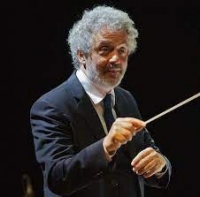
Nicola Piovani (born 26 May 1946) is an Italian light-classical musician, theater and film score composer, and winner of the 1999 Best Original Dramatic Score Oscar for the score of the Roberto Benigni film La Vita è bella, better known to English-speaking audiences as Life Is Beautiful.After high school, Piovani enrolled at the Sapienza University of Rome, receiving his degree in piano from the Verdi Conservatory in Milan in 1967, and later studied orchestration under the Greek composer Manos Hadjidakis.Among his more popular works is the score for the Federico Fellini film Intervista, his second of three collaborations with the famous director, the others being Ginger e Fred (Ginger and Fred in English) and La voce della luna (The Voice of the Moon). Years later, he composed a ballet titled Balletto Fellini.
Armando trovajoli
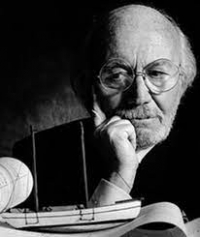
Armando Trovajoli was an Italian film composer and pianist with over 300 credits as composer and/or conductor, many of them jazz scores for exploitation films of the Commedia all'italiana genre. He collaborated with Vittorio De Sica on a number of projects, including one segment of Boccaccio '70.
Bach

Johann Sebastian Bach (31 March 1685 – 28 July 1750) was a German composer and organist whose sacred and secular works for choir, orchestra, and solo instruments drew together the strands of the Baroque period and brought it to its ultimate maturity. Although he introduced no new forms, he enriched the prevailing German style with a robust contrapuntal technique, an unrivalled control of harmonic and motivic organisation in composition for diverse musical forces, and the adaptation of rhythms and textures from abroad, particularly Italy and France.
Revered for their intellectual depth and technical and artistic beauty, Bach's works include the Brandenburg concertos; the Goldberg Variations; the English Suites, French Suites, Partitas, and Well-Tempered Clavier; the Mass in B Minor; the St. Matthew Passion; the St. John Passion; The Musical Offering; The Art of Fugue; the Sonatas and Partitas for violin solo; the Cello Suites; more than 200 surviving cantatas; and a similar number of organ works, including the celebrated Toccata and Fugue in D Minor.
While Bach's fame as an organist was great during his lifetime, he was not particularly well-known as a composer. His adherence to Baroque forms and contrapuntal style was considered "old-fashioned" by his contemporaries, especially late in his career when the musical fashion tended towards Rococo and later Classical styles. A revival of interest and performances of his music began early in the 19th century, and he is now widely considered to be one of the greatest composers in the Western tradition.
Revered for their intellectual depth and technical and artistic beauty, Bach's works include the Brandenburg concertos; the Goldberg Variations; the English Suites, French Suites, Partitas, and Well-Tempered Clavier; the Mass in B Minor; the St. Matthew Passion; the St. John Passion; The Musical Offering; The Art of Fugue; the Sonatas and Partitas for violin solo; the Cello Suites; more than 200 surviving cantatas; and a similar number of organ works, including the celebrated Toccata and Fugue in D Minor.
While Bach's fame as an organist was great during his lifetime, he was not particularly well-known as a composer. His adherence to Baroque forms and contrapuntal style was considered "old-fashioned" by his contemporaries, especially late in his career when the musical fashion tended towards Rococo and later Classical styles. A revival of interest and performances of his music began early in the 19th century, and he is now widely considered to be one of the greatest composers in the Western tradition.
Harold Garrett
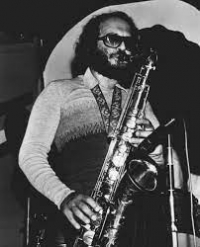
Harold Garrett. tb, b, Musician of Jazz. Sax Player Genres. Jazz; Pop; Soundtrack. Plays With. Woody Herman And His Orchestra.
José María Cano
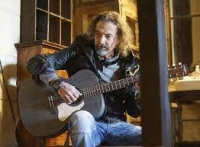
José Cano Andrés is a Spanish visual artist, musician, composer, and record producer. From 1982 to 1998, he was a member and principal composer of the Spanish pop-rock band Mecano. Since 1998, he works primarily in the visual arts.
Carl Zeller
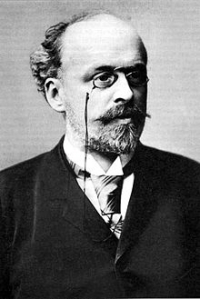
Carl Adam Johann Nepomuk Zeller (19 June 1842 – 17 August 1898) was an Austrian composer of operettas.
Zeller was born in Sankt Peter in der Au, the only child of physician Johann Zeller and Maria Anna Elizabeth. Zeller's father died before his first birthday, after which his mother remarried Ernest Friedinger. In 1875, Zeller married Anna Maria Schwetz.
Zeller was born in Sankt Peter in der Au, the only child of physician Johann Zeller and Maria Anna Elizabeth. Zeller's father died before his first birthday, after which his mother remarried Ernest Friedinger. In 1875, Zeller married Anna Maria Schwetz.
Dave Brubeck
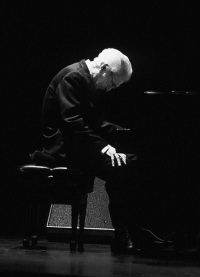
David Warren Brubeck (born December 6, 1920 in Concord, California), better known as Dave Brubeck, is an American jazz pianist. Regarded as a genius in his field, he has written a number of jazz standards, including "In Your Own Sweet Way" and "The Duke". Brubeck's style ranges from refined to bombastic, reflecting his mother's attempts at classical training and his improvisational skills. Much of his music employs unusual time signatures.
His long-time musical partner, alto saxophonist Paul Desmond, wrote the Dave Brubeck Quartet's most famous piece, "Take Five", which is in 5/4 time and has endured as a jazz classic. Brubeck experimented with time signatures through much of his career, recording "Pick Up Sticks" in 6/4, "Unsquare Dance" in 7/4, and "Blue Rondo à la Turk" in 9/8. He also provided music for the TV animated miniseries "This Is America, Charlie Brown".
His long-time musical partner, alto saxophonist Paul Desmond, wrote the Dave Brubeck Quartet's most famous piece, "Take Five", which is in 5/4 time and has endured as a jazz classic. Brubeck experimented with time signatures through much of his career, recording "Pick Up Sticks" in 6/4, "Unsquare Dance" in 7/4, and "Blue Rondo à la Turk" in 9/8. He also provided music for the TV animated miniseries "This Is America, Charlie Brown".
Guiseppe Verdi

Giuseppe Fortunino Francesco Verdi (Italian pronunciation: ; 10 October 1813 – 27 January 1901) was an Italian Romantic composer, mainly of opera. He was one of the most influential composers of the 19th century. His works are frequently performed in opera houses throughout the world and, transcending the boundaries of the genre, some of his themes have long since taken root in popular culture - such as "La donna è mobile" from Rigoletto, "Va, pensiero" (The Chorus of the Hebrew Slaves) from Nabucco, "Libiamo ne' lieti calici" (The Drinking Song) from La traviata and the "Grand March" from Aida. Although his work was sometimes criticized for using a generally diatonic rather than a chromatic musical idiom and having a tendency toward melodrama, Verdi’s masterworks dominate the standard repertoire a century and a half after their composition.
Verdi's predecessors who influenced his music were Rossini, Bellini, Giacomo Meyerbeer and, most notably, Gaetano Donizetti and Saverio Mercadante. With the exception of Otello and Aida, he was free of Wagner's influence. Although respectful of Gounod, Verdi was careful not to learn anything from the Frenchman whom many of Verdi's contemporaries regarded as the greatest living composer. Some strains in Aida suggest at least a superficial familiarity with the works of the Russian composer Mikhail Glinka, whom Franz Liszt, after his tour of the Russian Empire as a pianist, popularized in Western Europe.
Throughout his career, Verdi rarely utilised the high C in his tenor arias, citing the fact that the opportunity to sing that particular note in front of an audience distracts the performer before and after the note appears. However, he did provide high Cs to Duprez in Jérusalem and to Tamberlick in the original version of La forza del destino. The high C often heard in the aria Di quella pira does not appear in Verdi's score.
Verdi's predecessors who influenced his music were Rossini, Bellini, Giacomo Meyerbeer and, most notably, Gaetano Donizetti and Saverio Mercadante. With the exception of Otello and Aida, he was free of Wagner's influence. Although respectful of Gounod, Verdi was careful not to learn anything from the Frenchman whom many of Verdi's contemporaries regarded as the greatest living composer. Some strains in Aida suggest at least a superficial familiarity with the works of the Russian composer Mikhail Glinka, whom Franz Liszt, after his tour of the Russian Empire as a pianist, popularized in Western Europe.
Throughout his career, Verdi rarely utilised the high C in his tenor arias, citing the fact that the opportunity to sing that particular note in front of an audience distracts the performer before and after the note appears. However, he did provide high Cs to Duprez in Jérusalem and to Tamberlick in the original version of La forza del destino. The high C often heard in the aria Di quella pira does not appear in Verdi's score.
Brahms

Johannes Brahms (May 7, 1833 â April 3, 1897) was a German composer of the Romantic period. He was born in Hamburg and in his later years he settled in Vienna, Austria.
Brahms maintained a Classical sense of form and order in his works â in contrast to the opulence of the music of many of his contemporaries. Thus many admirers (though not necessarily Brahms himself) saw him as the champion of traditional forms and "pure music," as opposed to the New German embrace of program music.
Brahms venerated Beethoven: in the composer's home, a marble bust of Beethoven looked down on the spot where he composed, and some passages in his works are reminiscent of Beethoven's style. The main theme of the finale of Brahms's First Symphony is reminiscent of the main theme of the finale of Beethoven's Ninth, and when this resemblance was pointed out to Brahms he replied that any ass â jeder Esel â could see that.
Ein deutsches Requiem was partially inspired by his mother's death in 1865, but also incorporates material from a Symphony he started in 1854, but abandoned following Schumann's suicide attempt. He once wrote that the Requiem "belonged to Schumann". The first movement of this abandoned Symphony was re-worked as the first movement of the First Piano Concerto.
Brahms also loved the Classical composers Mozart and Haydn. He collected first editions and autographs of their works, and edited performing editions. He also studied the music of pre-classical composers, including Giovanni Gabrieli, Johann Adolph Hasse, Heinrich Schütz and especially Johann Sebastian Bach. His friends included leading musicologists, and with Friedrich Chrysander he edited an edition of the works of François Couperin. He looked to older music for inspiration in the arts of strict counterpoint; the themes of some of his works are modelled on Baroque sources, such as Bach's The Art of Fugue in the fugal finale of Cello Sonata No. 1, or the same composer's Cantata No. 150 in the passacaglia theme of the Fourth Symphony's finale.
Brahms maintained a Classical sense of form and order in his works â in contrast to the opulence of the music of many of his contemporaries. Thus many admirers (though not necessarily Brahms himself) saw him as the champion of traditional forms and "pure music," as opposed to the New German embrace of program music.
Brahms venerated Beethoven: in the composer's home, a marble bust of Beethoven looked down on the spot where he composed, and some passages in his works are reminiscent of Beethoven's style. The main theme of the finale of Brahms's First Symphony is reminiscent of the main theme of the finale of Beethoven's Ninth, and when this resemblance was pointed out to Brahms he replied that any ass â jeder Esel â could see that.
Ein deutsches Requiem was partially inspired by his mother's death in 1865, but also incorporates material from a Symphony he started in 1854, but abandoned following Schumann's suicide attempt. He once wrote that the Requiem "belonged to Schumann". The first movement of this abandoned Symphony was re-worked as the first movement of the First Piano Concerto.
Brahms also loved the Classical composers Mozart and Haydn. He collected first editions and autographs of their works, and edited performing editions. He also studied the music of pre-classical composers, including Giovanni Gabrieli, Johann Adolph Hasse, Heinrich Schütz and especially Johann Sebastian Bach. His friends included leading musicologists, and with Friedrich Chrysander he edited an edition of the works of François Couperin. He looked to older music for inspiration in the arts of strict counterpoint; the themes of some of his works are modelled on Baroque sources, such as Bach's The Art of Fugue in the fugal finale of Cello Sonata No. 1, or the same composer's Cantata No. 150 in the passacaglia theme of the Fourth Symphony's finale.
Corpse Bride
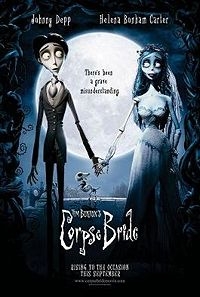
Tim Burton's Corpse Bride (often abbreviated as Corpse Bride) is a 2005 stop-motion-animation film based loosely on a 19th century Russian-Jewish folktale version of an older Jewish story and set in a fictional Victorian era village. It was directed by Tim Burton and Mike Johnson, and filmed at 3 Mills Studios in London. Johnny Depp led an all-star cast as the voice of Victor and Helena Bonham Carter (for whom the project was specially created) as the voice of the title character. This is the first animated film in which Johnny Depp has been a voice actor. The film's initial release was two weeks prior to that of Wallace & Gromit: The Curse of the Were-Rabbit, marking the first time that a stop-motion animated film and a claymation animated one were in simultaneous wide theatrical release. Interestingly, both films feature the voice of Helena Bonham Carter in a lead role and a character named Victor. Coincidentally, Burton's first stop-motion film, The Nightmare Before Christmas was released the same year as Nick Park's The Wrong Trousers.
The film was nominated in the 78th Academy Awards for Best Animated Feature. It lost to Wallace & Gromit: The Curse of the Were-Rabbit.
The film is dedicated to the memory of Joe Ranft.
The movie exhibits Burton's trademark style and recurring themes (the complex interaction between light and darkness, and of being caught between two irreconcilable worlds). Life is portrayed as boring and dully gray tinted while death is more fun, as evidenced by the brighter colors and jaunty music. The movie can be particularly compared to The Nightmare Before Christmas, Burton's previous stop-motion feature project (directed by Henry Selick and based on a Tim Burton poem, which Corpse Bride director Mike Johnson worked on as an animator) and Beetlejuice, especially in the scenes depicting the underworld and its deceased denizens. The studio intentionally emphasized the links, as some commercials for Corpse Bride were accompanied by songs from The Nightmare Before Christmas (specifically, "What's This"); also, in an issue of Disney Adventures, Emily (the title character) was compared to The Nightmare Before Christmas's Sally, despite the stark contrasts in personality between the outspoken, free-spirited Emily and the quiet, timid Sally. The Corpse Bride is also considered to be the spiritual successor of The Nightmare Before Christmas.
Most of the characters in the film bear a strong resemblance to the original cast of the British period drama Upstairs, Downstairs. In the "Special Features" section of the DVD, Tim Burton states that the films' setting pays tribute to the series, with the Land of the Living being the "upstairs", and the Land of the Dead being the "downstairs".
The film was nominated in the 78th Academy Awards for Best Animated Feature. It lost to Wallace & Gromit: The Curse of the Were-Rabbit.
The film is dedicated to the memory of Joe Ranft.
The movie exhibits Burton's trademark style and recurring themes (the complex interaction between light and darkness, and of being caught between two irreconcilable worlds). Life is portrayed as boring and dully gray tinted while death is more fun, as evidenced by the brighter colors and jaunty music. The movie can be particularly compared to The Nightmare Before Christmas, Burton's previous stop-motion feature project (directed by Henry Selick and based on a Tim Burton poem, which Corpse Bride director Mike Johnson worked on as an animator) and Beetlejuice, especially in the scenes depicting the underworld and its deceased denizens. The studio intentionally emphasized the links, as some commercials for Corpse Bride were accompanied by songs from The Nightmare Before Christmas (specifically, "What's This"); also, in an issue of Disney Adventures, Emily (the title character) was compared to The Nightmare Before Christmas's Sally, despite the stark contrasts in personality between the outspoken, free-spirited Emily and the quiet, timid Sally. The Corpse Bride is also considered to be the spiritual successor of The Nightmare Before Christmas.
Most of the characters in the film bear a strong resemblance to the original cast of the British period drama Upstairs, Downstairs. In the "Special Features" section of the DVD, Tim Burton states that the films' setting pays tribute to the series, with the Land of the Living being the "upstairs", and the Land of the Dead being the "downstairs".
Klaus Badelt

Klaus Badelt (born 1968) is a German composer, best known for composing film scores.
Badelt was born in Frankfurt, Germany. He started his musical career composing for many successful movies and commercials in his homeland. In 1998, Oscar-winning film composer Hans Zimmer invited Badelt to work at Media Ventures in Santa Monica, his studio co-owned by Jay Rifkin. Since then, Badelt has been working on a number of his own film and television projects such as The Time Machine and K-19: The Widowmaker. He has also collaborated with other Media Ventures composers, such as Harry Gregson-Williams, John Powell, and Zimmer.
While collaborating with Zimmer, Badelt has contributed to the Oscar-nominated scores for The Thin Red Line and The Prince of Egypt, as well as writing music for many well known directors including Ridley Scott, Tony Scott, Terrence Mallick, John Woo, Kathryn Bigelow, Jeffrey Katzenberg, Tom Cruise, Sean Penn, Gore Verbinski, and Steven Spielberg.
Badelt co-produced the score to Hollywood box office hit Gladiator, directed by Ridley Scott, as well as writing portions of the score with singer/composer Lisa Gerrard. Having contributed music to Gladiator, Mission: Impossible 2 and Michael Kamen's score for X-Men, Badelt was involved in the three most successful movies in 2000. Badelt also collaborated with Zimmer on other successful films, such as The Pledge, and 2001 blockbusters Hannibal and Pearl Harbor. One of his more famous - and more popular - scores is the score to the 2003 film Pirates of the Caribbean: The Curse of the Black Pearl.
Among Badelt's most critically celebrated scores are the Chinese fantasy film The Promise and Dreamworks' remake of The Time Machine, the latter which earned him the Discovery of the Year Award at the World Soundtrack Awards 2003.
Badelt was born in Frankfurt, Germany. He started his musical career composing for many successful movies and commercials in his homeland. In 1998, Oscar-winning film composer Hans Zimmer invited Badelt to work at Media Ventures in Santa Monica, his studio co-owned by Jay Rifkin. Since then, Badelt has been working on a number of his own film and television projects such as The Time Machine and K-19: The Widowmaker. He has also collaborated with other Media Ventures composers, such as Harry Gregson-Williams, John Powell, and Zimmer.
While collaborating with Zimmer, Badelt has contributed to the Oscar-nominated scores for The Thin Red Line and The Prince of Egypt, as well as writing music for many well known directors including Ridley Scott, Tony Scott, Terrence Mallick, John Woo, Kathryn Bigelow, Jeffrey Katzenberg, Tom Cruise, Sean Penn, Gore Verbinski, and Steven Spielberg.
Badelt co-produced the score to Hollywood box office hit Gladiator, directed by Ridley Scott, as well as writing portions of the score with singer/composer Lisa Gerrard. Having contributed music to Gladiator, Mission: Impossible 2 and Michael Kamen's score for X-Men, Badelt was involved in the three most successful movies in 2000. Badelt also collaborated with Zimmer on other successful films, such as The Pledge, and 2001 blockbusters Hannibal and Pearl Harbor. One of his more famous - and more popular - scores is the score to the 2003 film Pirates of the Caribbean: The Curse of the Black Pearl.
Among Badelt's most critically celebrated scores are the Chinese fantasy film The Promise and Dreamworks' remake of The Time Machine, the latter which earned him the Discovery of the Year Award at the World Soundtrack Awards 2003.
Sydney Smith
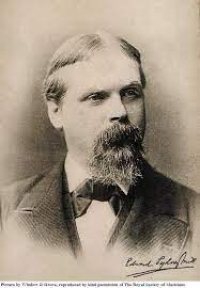
Sydney Smith (14 July 1839 – 3 March 1889) was a leading English pianist and composer in Victorian England.
Born in Dorchester, Dorset, Smith grew up in a family of musicians. His father was the head of a music school and often gave concerts with his two sons Sydney and Boyton. Smith studied piano in Leipzig with Ignaz Moscheles and Louis Plaidy, cello with Friedrich Grützmacher, and composition with Julius Rietz. He returned to England in 1858, settling the following year in London, where he remained until his death, highly regarded as a teacher and composer. He composed or transcribed about 400 works for the piano. These were extremely popular in salons in England in the 19th century, particularly the early works. Many pieces were issued both as solo pieces and as piano duets.[citati
Born in Dorchester, Dorset, Smith grew up in a family of musicians. His father was the head of a music school and often gave concerts with his two sons Sydney and Boyton. Smith studied piano in Leipzig with Ignaz Moscheles and Louis Plaidy, cello with Friedrich Grützmacher, and composition with Julius Rietz. He returned to England in 1858, settling the following year in London, where he remained until his death, highly regarded as a teacher and composer. He composed or transcribed about 400 works for the piano. These were extremely popular in salons in England in the 19th century, particularly the early works. Many pieces were issued both as solo pieces and as piano duets.[citati
Arthur Coquard
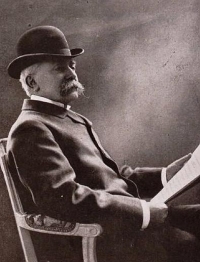
Arthur Coquard was a French composer and music critic. He studied composition with César Franck, and was a music critic for Le Monde and L'Echo de Paris. He served as director of the Institut National des Jeunes Aveugles from 1891–99. Coquard completed Edouard Lalo's opera, La jacquerie.
Apocalyptica

Apocalyptica is a Finnish cello metal band, composed of classically trained cellists and, since 2005, a drummer. Three of the cellists are graduates of the Sibelius Academy in Helsinki, Finland. Their music features elements from classical music, neo-classical metal, thrash metal, and symphonic metal.
Kristin Chenoweth

Kristin Dawn Chenoweth is an American singer, writer and actress.
Date of birth: July 24, 1968 (51 years old), Broken Arrow, Oklahoma, United States
Awards: Tony Award for Best Supporting Actress, MORE
Education: University of North Carolina, Oklahoma City University, Broken Arrow High School
Date of birth: July 24, 1968 (51 years old), Broken Arrow, Oklahoma, United States
Awards: Tony Award for Best Supporting Actress, MORE
Education: University of North Carolina, Oklahoma City University, Broken Arrow High School
Sting
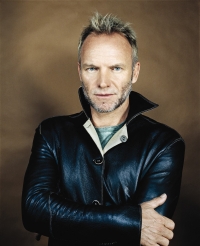
Gordon Matthew Thomas Sumner, CBE (born October 2, 1951), better known by his stage name Sting, is a three time Academy Award-nominated and multiple Grammy-winning English musician from Wallsend in North Tyneside. Prior to starting his solo career, he was the principal songwriter, lead singer and bassist of the rock band The Police. As a solo musician and member of The Police, Sting has sold over 100 million records, and received over sixteen Grammy Awards for his work, receiving his first Grammy for Best Rock Instrumental Performance in 1981, and receiving an Oscar nomination for best song.
Sting has stated that he gained his nickname while with the Phoenix Jazzmen. He once performed wearing a black and yellow sweater with hooped stripes that bandleader Gordon Solomon had noted made him look like a bumblebee; thus Sumner became "Sting". He uses Sting almost exclusively, except on official documents. In a press conference filmed in the movie Bring on the Night, he jokingly stated when referred to by a journalist as Gordon, "My children call me Sting, my mother calls me Sting, who is this Gordon character?"
Sting has stated that he gained his nickname while with the Phoenix Jazzmen. He once performed wearing a black and yellow sweater with hooped stripes that bandleader Gordon Solomon had noted made him look like a bumblebee; thus Sumner became "Sting". He uses Sting almost exclusively, except on official documents. In a press conference filmed in the movie Bring on the Night, he jokingly stated when referred to by a journalist as Gordon, "My children call me Sting, my mother calls me Sting, who is this Gordon character?"
Mozart

Wolfgang Amadeus Mozart, full name Johann Chrysostom Wolfgang Amadeus Mozart (27 January 1756 â 5 December 1791) was a prolific and influential composer of the Classical era. His over 600 compositions include works widely acknowledged as pinnacles of symphonic, concertante, chamber, piano, operatic, and choral music. Mozart is among the most enduringly popular of classical composers, and many of his works are part of the standard concert repertoire.
Mozart's music, like Haydn's, stands as an archetypal example of the Classical style. His works spanned the period during which that style transformed from one exemplified by the style galant to one that began to incorporate some of the contrapuntal complexities of the late Baroque, complexities against which the galant style had been a reaction. Mozart's own stylistic development closely paralleled the development of the classical style as a whole. In addition, he was a versatile composer and wrote in almost every major genre, including symphony, opera, the solo concerto, chamber music including string quartet and string quintet, and the piano sonata. While none of these genres were new, the piano concerto was almost single-handedly developed and popularized by Mozart. He also wrote a great deal of religious music, including masses; and he composed many dances, divertimenti, serenades, and other forms of light entertainment.
The central traits of the classical style can be identified in Mozart's music. Clarity, balance, and transparency are hallmarks of his work.
Mozart's music, like Haydn's, stands as an archetypal example of the Classical style. His works spanned the period during which that style transformed from one exemplified by the style galant to one that began to incorporate some of the contrapuntal complexities of the late Baroque, complexities against which the galant style had been a reaction. Mozart's own stylistic development closely paralleled the development of the classical style as a whole. In addition, he was a versatile composer and wrote in almost every major genre, including symphony, opera, the solo concerto, chamber music including string quartet and string quintet, and the piano sonata. While none of these genres were new, the piano concerto was almost single-handedly developed and popularized by Mozart. He also wrote a great deal of religious music, including masses; and he composed many dances, divertimenti, serenades, and other forms of light entertainment.
The central traits of the classical style can be identified in Mozart's music. Clarity, balance, and transparency are hallmarks of his work.
Alexis Chauvet

Charles-Alexis Chauvet (7 June 1837 – 29 January 1871) was a French organist and composer.Charles-Alexis Chauvet (7 June 1837 – 29 January 1871) was a French organist and composer.
Galactic

Galactic is an American jam band from New Orleans, Louisiana.Formed in 1994 as an octet (under the name Galactic Prophylactic) and including singer Chris Lane and guitarist Rob Gowen, the group was soon pared down to a sextet of: guitarist Jeff Raines, bassist Robert Mercurio, drummer Stanton Moore, Hammond organist Rich Vogel, Theryl DeClouet on vocals, and later adding saxophonist Ben Ellman.The group was started when Raines and Mercurio, childhood friends from affluent Chevy Chase, Maryland, moved to New Orleans together to attend college at Tulane and Loyola Universities, became enamored of the local funk scene, populated by such legendary acts as The Meters and Dirty Dozen Brass Band and inspired by local legends such as Professor Longhair. There they teamed with noted New Orleans drummer Stanton Moore, saxophonist/harmonica (now producer) Ben Ellman, Rich Vogel, and Theryl de Clouet. In 2004, the band parted ways with vocalist DeClouet, and continued as an instrumental group until 2007 when they released From the Corner to the Block featuring rappers ranging from Juvenile, Chali 2na, Boots Riley, and Lyrics Born. They continue to tour with different vocalists: 2011 and 2012 with Cyril Neville, 2011 through 2014 with Corey Glover, 2014 with Maggie Koerner, from 2015 with Erica Falls. They have also toured with trombonist Corey Henry from 2009 through 2016 and trumpet player Shamarr Allen from 2016. They have been releasing albums consistently since 1996.
Valerie Simpson

Valerie Simpson Songwriter Born: August 26, 1946 (age 75 years), Bronx, New York, United States Spouse: Nickolas Ashford (m. 1974–2011) Children: Asia Ashford, Nicole Ashford Siblings: Ray Simpson Songs Solid Solid · 1984 It Seems to Hang On Is It Still Good to Ya · 1978 Found A Cure Stay Free (Expanded Version) · 1979.
Ludwig van Beethoven

Ludwig van Beethoven (/ˈlʊdvɪɡ væn ˈbeɪt(h)oʊvən/ (About this soundlisten); German: (About this soundlisten); baptised 17 December 1770 – 26 March 1827) was a German composer and pianist. A crucial figure in the transition between the classical and romantic eras in classical music, he remains one of the most recognized and influential musicians of this period, and is considered to be one of the greatest composers of all time.
Beethoven was born in Bonn, the capital of the Electorate of Cologne, and part of the Holy Roman Empire. He displayed his musical talents at an early age and was vigorously taught by his father Johann van Beethoven, and was later taught by composer and conductor Christian Gottlob Neefe. At age 21, he moved to Vienna and studied composition with Joseph Haydn. Beethoven then gained a reputation as a virtuoso pianist, and was soon courted by Prince Lichnowsky for compositions, which resulted in Opus 1 in 1795.
Beethoven was born in Bonn, the capital of the Electorate of Cologne, and part of the Holy Roman Empire. He displayed his musical talents at an early age and was vigorously taught by his father Johann van Beethoven, and was later taught by composer and conductor Christian Gottlob Neefe. At age 21, he moved to Vienna and studied composition with Joseph Haydn. Beethoven then gained a reputation as a virtuoso pianist, and was soon courted by Prince Lichnowsky for compositions, which resulted in Opus 1 in 1795.
Agustin Barrios
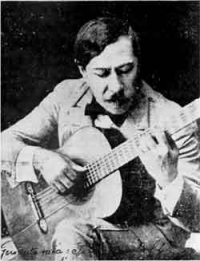
Agustín Pío Barrios (also known as Agustín Barrios Mangoré. May 5, 1885 - Aug 7 1944), an eminent Paraguayan guitarist and composer, was born May 5, 1885, in the department of Misiones, Paraguay and died August 7, 1944 in San Salvador, El Salvador. It has been generally accepted that the guitarist was born in San Juan Bautista in Misiones, however, there is no definitive proof of this as his baptismal document found in the book of registries in the cathedral in San Juan Bautista does not state his precise place of birth. Also, several biographers and authorities present convincing documented evidence that Barrios was born, instead, in the nearby town of Villa Florida, Misiones, situated on the Tebicuary River some 30 km north of San Juan Bautista.
Bill Withers
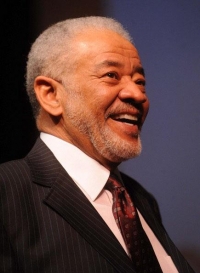
Bill Withers (born July 4, 1938 in Slab Fork, West Virginia) is an American singer-songwriter who performed and recorded from the late 1960s until the mid 1980s. Some of his best-known songs are "Ain't No Sunshine," "Use Me," "Lovely Day," "Lean on Me", "Grandma's Hands" and "Just the Two of Us".
Frank Sinatra

Francis Albert "Frank" Sinatra (December 12, 1915 â May 14, 1998) was an American singer and actor.
Beginning his musical career in the swing era with Harry James and Tommy Dorsey, Sinatra became a solo artist with great success in the early to mid-1940s, being the idol of the "bobby soxers". His professional career had stalled by the 1950s, but it was reborn in 1954 after he won the Academy Award for Best Supporting Actor.
He signed with Capitol Records and released several critically lauded albums (such as In the Wee Small Hours, Songs for Swingin' Lovers, Come Fly with Me, Only the Lonely and Nice 'n' Easy). Sinatra left Capitol to found his own record label, Reprise Records (finding success with albums such as Ring-A-Ding-Ding, Sinatra at the Sands and Francis Albert Sinatra & Antonio Carlos Jobim), toured internationally, and fraternized with the Rat Pack and President John F. Kennedy in the early 1960s. Sinatra turned 50 in 1965, recorded the retrospective September of My Years, starred in the Emmy-winning television special Frank Sinatra: A Man and His Music, and scored hits with "Strangers in the Night" and "My Way".
Sinatra attempted to weather the changing tastes in popular music, but with dwindling album sales and after appearing in several poorly received films, he retired in 1971. Coming out of retirement in 1973, he recorded several albums, scoring a hit with "(Theme From) New York, New York" in 1980, and toured both within the United States and internationally until a few years before his death in 1998.
Sinatra also forged a career as a dramatic actor, winning the Academy Award for Best Supporting Actor for his performance in From Here to Eternity, and he was nominated for the Academy Award for Best Actor for The Man with the Golden Arm. His also starred in such musicals as High Society, Pal Joey, Guys and Dolls and On the Town. Sinatra was honored with the Kennedy Center Honors in 1983 and awarded the Presidential Medal of Freedom by Ronald Reagan in 1985 and the Congressional Gold Medal in 1997. Sinatra was also the recipient of eleven Grammy Awards, including the Grammy Trustees Award, Grammy Legend Award and the Grammy Lifetime Achievement Award.
Beginning his musical career in the swing era with Harry James and Tommy Dorsey, Sinatra became a solo artist with great success in the early to mid-1940s, being the idol of the "bobby soxers". His professional career had stalled by the 1950s, but it was reborn in 1954 after he won the Academy Award for Best Supporting Actor.
He signed with Capitol Records and released several critically lauded albums (such as In the Wee Small Hours, Songs for Swingin' Lovers, Come Fly with Me, Only the Lonely and Nice 'n' Easy). Sinatra left Capitol to found his own record label, Reprise Records (finding success with albums such as Ring-A-Ding-Ding, Sinatra at the Sands and Francis Albert Sinatra & Antonio Carlos Jobim), toured internationally, and fraternized with the Rat Pack and President John F. Kennedy in the early 1960s. Sinatra turned 50 in 1965, recorded the retrospective September of My Years, starred in the Emmy-winning television special Frank Sinatra: A Man and His Music, and scored hits with "Strangers in the Night" and "My Way".
Sinatra attempted to weather the changing tastes in popular music, but with dwindling album sales and after appearing in several poorly received films, he retired in 1971. Coming out of retirement in 1973, he recorded several albums, scoring a hit with "(Theme From) New York, New York" in 1980, and toured both within the United States and internationally until a few years before his death in 1998.
Sinatra also forged a career as a dramatic actor, winning the Academy Award for Best Supporting Actor for his performance in From Here to Eternity, and he was nominated for the Academy Award for Best Actor for The Man with the Golden Arm. His also starred in such musicals as High Society, Pal Joey, Guys and Dolls and On the Town. Sinatra was honored with the Kennedy Center Honors in 1983 and awarded the Presidential Medal of Freedom by Ronald Reagan in 1985 and the Congressional Gold Medal in 1997. Sinatra was also the recipient of eleven Grammy Awards, including the Grammy Trustees Award, Grammy Legend Award and the Grammy Lifetime Achievement Award.
Scarlatti
Giuseppe Domenico Scarlatti was an Italian composer. He is classified primarily as a Baroque composer chronologically, although his music was influential in the development of the Classical style and he was one of the few Baroque composers to transition into the classical period.
Joja Wendt
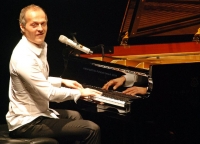
Joja Wendt (born 31 July 1964 as Johan Wendt) is a German jazz pianist and composer.Wendt was born in Hamburg. The son of a female singer and a doctor, he began playing the piano at the age of four. He decided soon after leaving school at the Lise-Meitner-Gymnasium in Osdorf, Hamburg to turn to jazz. He then played regularly in the Hamburg music pub Sperl, where he was discovered by Joe Cocker. Cocker took Wendt as the opening act of his tour of Germany, so he became known quickly throughout the country.
Karol Lipiński
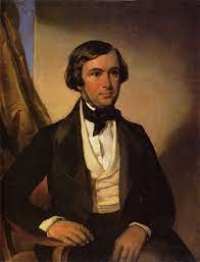
Karol Lipiński. Violinist, composer and conductor; born 30 October 1790 in Radzyn (Podlasie region); died 16 December 1861 in Urlov near Lviv. A violinist, composer and conductor born on 30 October 1790 in Radzyń (Podlasie region) and died 16 December 1861 in Urlov near Lviv.
Sarah Hopkins
Sarah Hopkins is a unique Australian composer-performer, highly acclaimed for her visionary music and inspiring performances for cello, harmonic overtone singing, handbells, choir and the celestial Harmonic Whirlies of her own creation.
Aof Pongsak

Pongsak Rattanapong, better known by his nickname Aof, is a Thai singer and actor who gained popularity through the first season of the Thai reality show Academy Fantasia. He is known for his soft voice and sensitive songs.
Bruno Mars

Peter Gene Hernandez (born October 8, 1985), better known by his stage name Bruno Mars, is an American singer-songwriter and music producer. Raised in Honolulu, Hawaii by a family of musicians, Mars began making music at a young age. After performing in various musical venues in his hometown throughout his childhood, he decided to pursue a musical career. Mars began producing songs for other artists, joining production team The Smeezingtons.
He became recognized as a solo artist after lending his vocals and co-writing the hooks for the songs "Nothin' on You" by B.o.B, and "Billionaire" by Travie McCoy. He also co-wrote the hits "Right Round" by Flo Rida featuring Kesha, "Wavin' Flag" by K'naan, and "Fuck You!" by Cee Lo Green. In October 2010, he released his debut album, Doo-Wops & Hooligans. Anchored by the singles "Just the Way You Are" and "Grenade", the album peaked at number three on the Billboard 200. He has been nominated for seven Grammys at the 53rd Grammy Awards, which will be held on February 13, 2011.
He became recognized as a solo artist after lending his vocals and co-writing the hooks for the songs "Nothin' on You" by B.o.B, and "Billionaire" by Travie McCoy. He also co-wrote the hits "Right Round" by Flo Rida featuring Kesha, "Wavin' Flag" by K'naan, and "Fuck You!" by Cee Lo Green. In October 2010, he released his debut album, Doo-Wops & Hooligans. Anchored by the singles "Just the Way You Are" and "Grenade", the album peaked at number three on the Billboard 200. He has been nominated for seven Grammys at the 53rd Grammy Awards, which will be held on February 13, 2011.
The Turtles
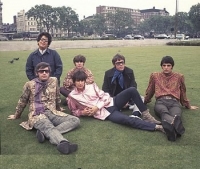
The Turtles are a U.S. rock group led by vocalists Howard Kaylan and Mark Volman. The band became notable for several Top 40 hits beginning with its cover version of Bob Dylan's "It Ain't Me Babe" in 1965. The group scored its biggest and best-known hit in 1967 with the song "Happy Together".
Yann Tiersen

Guillaume Yann Tiersen (born 23 June 1970) is a French musician and composer known internationally for composing the score to the Jean-Pierre Jeunet movie Amélie. His music is recognized by its use of a large variety of instruments in relatively minimalist compositions, often with a touch of either European classical music or French folk music, using primarily the piano, accordion or violin together with instruments like the melodica, xylophone, toy piano, ondes martenot, harpsichord and typewriter. His musical style is reminiscent of Frédéric Chopin, Erik Satie, Philip Glass and Michael Nyman.
Georges Bizet

Georges Bizet (25 October 1838 – 3 June 1875) was a French composer and pianist of the Romantic era. He is best known for the opera Carmen.
Bizet was born at 26 rue de la Tour d'Auvergne in the 9th arrondissement of Paris in 1838. He was registered with the legal name Alexandre César Léopold Bizet, but he was baptised on 16 March 1840 with the first name Georges, and he was always known thereafter as Georges Bizet. His father Adolphe Armand Bizet (1810-86) was an amateur singer and composer, and his mother, Aimée Léopoldine Joséphine née Delsarte (1814-61), was the sister of the famous singing teacher François Delsarte.
He entered the Paris Conservatory of Music on 9 October 1848, a fortnight before his tenth birthday. His teachers there were Pierre Zimmermann (fugue and counterpoint; often assisted by his son-in-law Charles Gounod), Antoine François Marmontel (piano), François Benoist (organ) and, on Zimmermann's death, Fromental Halévy, whose daughter he himself later married. He won first prizes for organ and fugue in 1855 and completed his earliest compositions.
His first symphony, the Symphony in C, was written in November 1855, when he was seventeen, evidently as a student assignment. It was unknown to the world until 1933, when it was discovered in the archives of the Paris Conservatory library. Upon its first performance in 1935, it was immediately hailed as a junior masterwork and a welcome addition to the early Romantic period repertoire. The symphony bears a stylistic resemblance to the first symphony of Gounod, first played earlier in the same year, and which Bizet had arranged for two pianos although present-day listeners may discern a similarity to music of Franz Schubert, whose work was little known in France at the time the symphony was written.
In 1857, a setting of the one-act operetta Le docteur Miracle won him a share in a prize offered by Jacques Offenbach. He also won the music composition scholarship of the Prix de Rome, the conditions of which required him to study in Rome for three years. There, his talent developed as he wrote such works as the opera buffa Don Procopio (1858-59). There he also composed his only major sacred work, Te Deum (1858), which he submitted to the Prix Rodrigues competition, a contest for Prix de Rome winners only. Bizet failed to win the Prix Rodrigues, and the Te Deum score remained unpublished until 1971. He made two attempts to write another symphony in 1859, but destroyed the manuscripts in December of that year. Apart from this period in Rome, Bizet lived in the Paris area all his life.
Shortly after leaving Rome in July 1860, but while still touring in Italy, he had the idea of writing a symphony in which each of the four movements would be a musical evocation of a different Italian city – Rome, Venice, Florence and Naples. On hearing of his mother's serious illness he cut short his Italian travels and returned to Paris in September 1860; she died a year later. The Scherzo of the symphony was completed by November 1861, but it was not until 1866 that the first version of the whole symphony was written. He subjected it to a number of revisions through to 1871, but died before ever producing what he considered the definitive version. For this reason, the work is sometimes described as "unfinished", but this is an inaccurate description as it was fully scored. It was published in 1880 as the Roma Symphony.
Bizet was born at 26 rue de la Tour d'Auvergne in the 9th arrondissement of Paris in 1838. He was registered with the legal name Alexandre César Léopold Bizet, but he was baptised on 16 March 1840 with the first name Georges, and he was always known thereafter as Georges Bizet. His father Adolphe Armand Bizet (1810-86) was an amateur singer and composer, and his mother, Aimée Léopoldine Joséphine née Delsarte (1814-61), was the sister of the famous singing teacher François Delsarte.
He entered the Paris Conservatory of Music on 9 October 1848, a fortnight before his tenth birthday. His teachers there were Pierre Zimmermann (fugue and counterpoint; often assisted by his son-in-law Charles Gounod), Antoine François Marmontel (piano), François Benoist (organ) and, on Zimmermann's death, Fromental Halévy, whose daughter he himself later married. He won first prizes for organ and fugue in 1855 and completed his earliest compositions.
His first symphony, the Symphony in C, was written in November 1855, when he was seventeen, evidently as a student assignment. It was unknown to the world until 1933, when it was discovered in the archives of the Paris Conservatory library. Upon its first performance in 1935, it was immediately hailed as a junior masterwork and a welcome addition to the early Romantic period repertoire. The symphony bears a stylistic resemblance to the first symphony of Gounod, first played earlier in the same year, and which Bizet had arranged for two pianos although present-day listeners may discern a similarity to music of Franz Schubert, whose work was little known in France at the time the symphony was written.
In 1857, a setting of the one-act operetta Le docteur Miracle won him a share in a prize offered by Jacques Offenbach. He also won the music composition scholarship of the Prix de Rome, the conditions of which required him to study in Rome for three years. There, his talent developed as he wrote such works as the opera buffa Don Procopio (1858-59). There he also composed his only major sacred work, Te Deum (1858), which he submitted to the Prix Rodrigues competition, a contest for Prix de Rome winners only. Bizet failed to win the Prix Rodrigues, and the Te Deum score remained unpublished until 1971. He made two attempts to write another symphony in 1859, but destroyed the manuscripts in December of that year. Apart from this period in Rome, Bizet lived in the Paris area all his life.
Shortly after leaving Rome in July 1860, but while still touring in Italy, he had the idea of writing a symphony in which each of the four movements would be a musical evocation of a different Italian city – Rome, Venice, Florence and Naples. On hearing of his mother's serious illness he cut short his Italian travels and returned to Paris in September 1860; she died a year later. The Scherzo of the symphony was completed by November 1861, but it was not until 1866 that the first version of the whole symphony was written. He subjected it to a number of revisions through to 1871, but died before ever producing what he considered the definitive version. For this reason, the work is sometimes described as "unfinished", but this is an inaccurate description as it was fully scored. It was published in 1880 as the Roma Symphony.
Henry Eccles
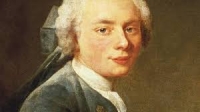
Henry (Henri) Eccles (1670–1742) was an English composer.As a violinist, Henry Eccles became part of the entourage of the Duke d'Aumont, French ambassador to Britain, with whom he returned to France around 1713. In 1720 he published, in Paris, Twelve Solos for the Violin dedicated to the Chevalier Joseph Gage - an English gentleman much involved in Parisian financial speculation at the time.
Luigi Boccherini
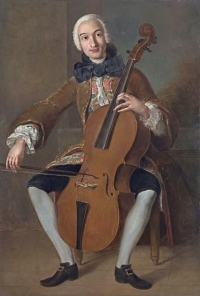
Ridolfo Luigi Boccherini (/ˌbɒkəˈriːni/, also US: /ˌboʊk-/, Italian: (About this soundlisten); 19 February 1743 – 28 May 1805) was an Italian, later Spanish, composer and cellist of the Classical era whose music retained a courtly and galante style even while he matured somewhat apart from the major European musical centers. He is best known for a minuet from his String Quintet in E, Op. 11, No. 5 (G 275), and the Cello Concerto in B flat major (G 482). The latter work was long known in the heavily altered version by German cellist and prolific arranger Friedrich Grützmacher, but has recently been restored to its original version.
Franz Schubert

Franz Peter Schubert (German pronunciation: ; January 31, 1797 – November 19, 1828) was an Austrian composer. He wrote some 600 Lieder, nine symphonies (including the famous "Unfinished Symphony"), liturgical music, operas, some incidental music, and a large body of chamber and solo piano music. He is particularly noted for his original melodic and harmonic writing.
Schubert was born into a musical family, and received formal musical training through much of his childhood. While Schubert had a close circle of friends and associates who admired his work (amongst them the prominent singer Johann Michael Vogl), wide appreciation of his music during his lifetime was limited at best. He was never able to secure adequate permanent employment, and for most of his career he relied on the support of friends and family. He made some money from published works, and occasionally gave private musical instruction. In the last year of his life he began to receive wider acclaim. He died at the age of 31 of "typhoid fever", a diagnosis which was vague at the time; several scholars suspect the real illness was tertiary syphilis.
Interest in Schubert's work increased dramatically in the decades following his death. Composers like Franz Liszt, Robert Schumann and Felix Mendelssohn discovered, collected, and championed his works in the 19th century, as did musicologist Sir George Grove. Franz Schubert is now widely considered to be one of the greatest composers in the Western tradition.
Schubert was born into a musical family, and received formal musical training through much of his childhood. While Schubert had a close circle of friends and associates who admired his work (amongst them the prominent singer Johann Michael Vogl), wide appreciation of his music during his lifetime was limited at best. He was never able to secure adequate permanent employment, and for most of his career he relied on the support of friends and family. He made some money from published works, and occasionally gave private musical instruction. In the last year of his life he began to receive wider acclaim. He died at the age of 31 of "typhoid fever", a diagnosis which was vague at the time; several scholars suspect the real illness was tertiary syphilis.
Interest in Schubert's work increased dramatically in the decades following his death. Composers like Franz Liszt, Robert Schumann and Felix Mendelssohn discovered, collected, and championed his works in the 19th century, as did musicologist Sir George Grove. Franz Schubert is now widely considered to be one of the greatest composers in the Western tradition.
Jaroslav Jezek
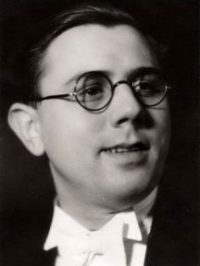
Jaroslav Jezek (September 25, 1906 - January 1, 1942) was a Czech composer, pianist and conductor, author of jazz, classical, incidental and film music.Ježek was born in the Prague quarter of Žižkov to the family of a tailor. He was almost blind from a young age. He studied composition at the Prague Conservatory as a pupil of Karel Boleslav Jirák (1924–1927), at the master school of composition with Josef Suk (1927–1930)
Kang Sung-yeon
Kang Sung-yeon is a South Korean actress. Kang made her acting debut in 1996 through MBC's Open Recruitment. Although her main profession was acting, she also contributed songs to several soundtracks and released two albums in 2001–2002 under the stage name Bobo.
Alejandro Sanz
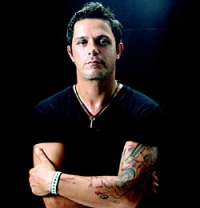
Alejandro Sanz, born Alejandro Sánchez Pizarro on December 18, 1968 in Madrid, is an Award winning, Spanish pop/ballad musician and singer-songwriter who has won a record 17 Latin Grammy´s, more than any other Spanish musician in history.
Sanz has won a total of 17 Grammys Awards (2 Regular Grammy Award and 15 Latin Grammy Awards) and has sold more than 25 million albums worldwide.
Sanz has won a total of 17 Grammys Awards (2 Regular Grammy Award and 15 Latin Grammy Awards) and has sold more than 25 million albums worldwide.
Mussorgsky
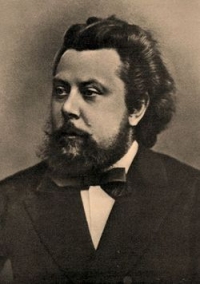
Modest Petrovich Mussorgsky (March 21, 1839 – March 28, 1881), one of the Russian composers known as the Five, was an innovator of Russian music. He strove to achieve a uniquely Russian musical identity, often in deliberate defiance of the established conventions of Western music.
Like his literary contemporary Fyodor Dostoyevsky, Mussorgsky depicts in his music "the insulted and the injured" with all their passion and pain. He raises these characters to tragic heights until the grotesque and majestic coexist. Mussorgsky could accomplish this not simply out of compassion or guilt towards them, but because in his works he almost becomes them. Mussorgsky's music is vivid, confused, feverish and ultimately hypnotizing —again, like Dostoyevsky at his best.
Many of his major works were inspired by Russian history, Russian folklore, and other nationalist themes, including the opera Boris Godunov, the orchestral tone poem Night on Bald Mountain, and the piano suite Pictures at an Exhibition. However, while Mussorgsky's music can be vivid and nationalistic, it does not glorify the powerful and is at times (such as in The Field-Marshal) antimilitaristic. For this reason, it was perceived as being directed against the state and its composer "under suspicion." He, like the others in The Russian Five, were considered dangerous extremists by the emperor and his court. This may have been the reason Tsar Alexander III personally crossed off Boris Godounov from the list of proposed pieces for the imperial opera in 1888.
For many years Mussorgsky's works were mainly known in versions revised or completed by other composers. Many of his most important compositions have recently come into their own in their original forms, and some of the original scores are now also available.
Like his literary contemporary Fyodor Dostoyevsky, Mussorgsky depicts in his music "the insulted and the injured" with all their passion and pain. He raises these characters to tragic heights until the grotesque and majestic coexist. Mussorgsky could accomplish this not simply out of compassion or guilt towards them, but because in his works he almost becomes them. Mussorgsky's music is vivid, confused, feverish and ultimately hypnotizing —again, like Dostoyevsky at his best.
Many of his major works were inspired by Russian history, Russian folklore, and other nationalist themes, including the opera Boris Godunov, the orchestral tone poem Night on Bald Mountain, and the piano suite Pictures at an Exhibition. However, while Mussorgsky's music can be vivid and nationalistic, it does not glorify the powerful and is at times (such as in The Field-Marshal) antimilitaristic. For this reason, it was perceived as being directed against the state and its composer "under suspicion." He, like the others in The Russian Five, were considered dangerous extremists by the emperor and his court. This may have been the reason Tsar Alexander III personally crossed off Boris Godounov from the list of proposed pieces for the imperial opera in 1888.
For many years Mussorgsky's works were mainly known in versions revised or completed by other composers. Many of his most important compositions have recently come into their own in their original forms, and some of the original scores are now also available.
Paramore

Paramore is an American Pop rock band that formed in Franklin, Tennessee in 2004 consisting of Hayley Williams (lead vocals/keyboard), Josh Farro (lead guitar/backing vocals), Jeremy Davis (bass guitar), and Zac Farro (drums). The group released their debut album All We Know Is Falling in 2005, and their second album Riot! in 2007, which was certified platinum in the US and gold in the UK and Ireland.
Star Wars
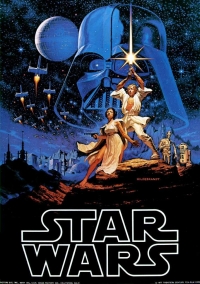
Star Wars is an epic space opera franchise initially conceived by George Lucas during the 1970s and significantly expanded since that time. The events depicted in Star Wars media take place in a fictional galaxy. Many species of alien creatures (often humanoid) are depicted. Robotic droids are also commonplace and are generally built to serve their owners. Space travel is common, and many planets in the galaxy are members of a Galactic Republic, later reorganized as the Galactic Empire.
One of the prominent elements of Star Wars is the "Force", which is an omnipresent form of energy which can be harnessed by those with that ability. It is described in the first produced film as "an energy field created by all living things binds the galaxy together." The Force allows users to perform a variety of supernatural feats (such as telekinesis, clairvoyance, precognition, and mind control) and also can amplify certain physical traits, such as speed and reflexes; these abilities can vary from user to user and can be improved through training. While the Force can be used for good, it has a dark side that, when pursued, imbues users with hatred, aggression, and malevolence. The six films feature the Jedi, who use the Force for good, and the Sith, who use the dark side for evil in an attempt to take over the galaxy. In the Expanded Universe many dark side users are Dark Jedi rather than Sith, mainly because of the Rule of Two.
One of the prominent elements of Star Wars is the "Force", which is an omnipresent form of energy which can be harnessed by those with that ability. It is described in the first produced film as "an energy field created by all living things binds the galaxy together." The Force allows users to perform a variety of supernatural feats (such as telekinesis, clairvoyance, precognition, and mind control) and also can amplify certain physical traits, such as speed and reflexes; these abilities can vary from user to user and can be improved through training. While the Force can be used for good, it has a dark side that, when pursued, imbues users with hatred, aggression, and malevolence. The six films feature the Jedi, who use the Force for good, and the Sith, who use the dark side for evil in an attempt to take over the galaxy. In the Expanded Universe many dark side users are Dark Jedi rather than Sith, mainly because of the Rule of Two.
Walt disney
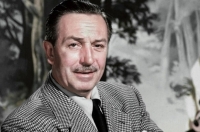
Walter Elias Disney (/ˈdɪzni/; December 5, 1901 – December 15, 1966) was an American entrepreneur, animator, voice actor and film producer. A pioneer of the American animation industry, he introduced several developments in the production of cartoons. As a film producer, Disney holds the record for most Academy Awards earned by an individual, having won 22 Oscars from 59 nominations. He was presented with two Golden Globe Special Achievement Awards and an Emmy Award, among other honors. Several of his films are included in the National Film Registry by the Library of Congress.
Luis de Briceño
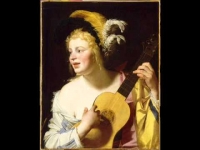
Luis de Briceño (also Briçeño, Brizeño; fl. 1610s–1630s) was a Spanish guitarist and music theorist who introduced the Spanish guitar style in France, where previously only the lute was considered a serious plucked instrument. He travelled in high courtly circles in both countries, and is first cited as an authority on the Spanish guitar in 1614 His Metodo mui facilissimo para aprender a tañer la guitarra a lo español (1626, Very Easy Method to Learn to Play the Guitar in the Spanish Style) is the main source of knowledge of the Spanish style, since few books appeared during this period in Spain itself.
Ernest Chausson
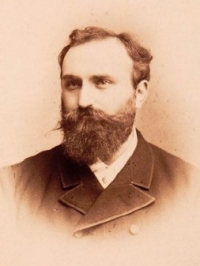
Amédée-Ernest Chausson (French: ; 20 January 1855 – 10 June 1899) was a French Romantic composer who died just as his career was beginning to flourish.Born in Paris into an affluent bourgeois family, Ernest Chausson was the sole surviving child of a building contractor who had made his fortune assisting Baron Haussmann in the redevelopment of Paris in the 1850s. To please his father, Chausson studied law and was appointed a barrister for the Court of Appeals, but had little or no interest in the profession.
Antonin Dvorak

Antonín Leopold Dvořák (English pronunciation: /ˈdvɒrʒɑːk/ DVOR-zhahk or /ˈdvɒrʒæk/ DVOR-zhak; Czech: ( listen); September 8, 1841 – May 1, 1904) was a Czech composer of Romantic music, who employed the idioms of the folk music of Moravia and his native Bohemia. His works include operas, symphonic, choral and chamber music. His best-known works include his New World Symphony, the Slavonic Dances, "American" String Quartet, and Cello Concerto in B minor.
Dvořák wrote in a variety of forms: his nine symphonies generally stick to classical models that Beethoven would have recognised, but he also worked in the newly developed symphonic poem form and the influence of Richard Wagner is apparent in some works. Many of his works also show the influence of Czech folk music, both in terms of rhythms and melodic shapes; perhaps the best known examples are the two sets of Slavonic Dances. Dvořák also wrote operas (of which the best known is Rusalka); serenades for string orchestra and wind ensemble; chamber music (including a number of string quartets, and quintets); songs; choral music; and piano music.
Dvořák wrote in a variety of forms: his nine symphonies generally stick to classical models that Beethoven would have recognised, but he also worked in the newly developed symphonic poem form and the influence of Richard Wagner is apparent in some works. Many of his works also show the influence of Czech folk music, both in terms of rhythms and melodic shapes; perhaps the best known examples are the two sets of Slavonic Dances. Dvořák also wrote operas (of which the best known is Rusalka); serenades for string orchestra and wind ensemble; chamber music (including a number of string quartets, and quintets); songs; choral music; and piano music.
Jules Massenet
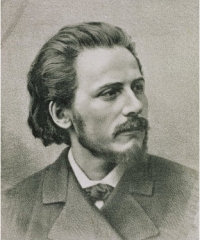
Jules (Émile Frédéric) Massenet (May 12, 1842 – August 13, 1912) was a French composer best known for his operas. His compositions were very popular in the late 19th and early 20th centuries, and he ranks as one of the greatest melodists of his era. Soon after his death, Massenet's style went out of fashion, and many of his operas fell into almost total oblivion. Apart from Manon and Werther, his works were rarely performed. However, since the mid-1970s, many operas of his such as Thaïs and Esclarmonde have undergone periodic revivals.
Adele

Adele Laurie Blue Adkins (born 5 May 1988 in Enfield, North London), She is the first recipient of the Brit Awards Critics' Choice, which was given to artists who, at the time, had yet to release an album. She debuted at number one with her Mercury Prize nominated debut album 19 in the UK album chart and has since then been certified platinum with sales over 500,000 copies.
Bellini
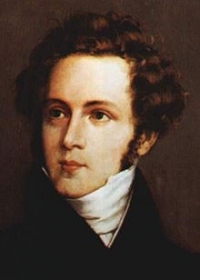
Vincenzo Salvatore Carmelo Francesco Bellini (3 November 1801 – 23 September 1835) was an Italian opera composer. His greatest works are I Capuleti ed i Montecchi (1830), La sonnambula (1831), Norma (1831), Beatrice di Tenda (1833), and I puritani (1835). Known for his long-flowing melodic lines, for which he was named "the Swan of Catania," Bellini was the quintessential composer of bel canto opera.
Fergie
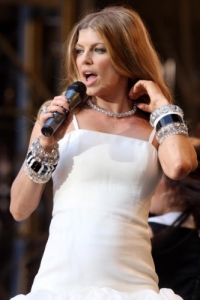
Stacy Ann Ferguson (born March 27, 1975), better known by her stage name Fergie, is an American pop/R&B singer-songwriter, rapper , fashion designer, model , philantropist and actress. She is a former member of the kids' television series Kids Incorporated, and the girl group Wild Orchid. Ferguson was also a co-host of the television show Great Pretenders. She is currently a vocalist for the hip hop/pop group the Black Eyed Peas, as well as a solo artist, having released her debut album, The Dutchess, in September 2006. The album has so far spawned three U.S. Billboard Hot 100 number one singles and five Top 5 hits, making The Dutchess the seventh album from a female artist to spawn five Top 5 hits.
 Sheet Music Max is a site for those who wants to access popular sheet music easily,
letting them download the sheet music for free for trial purposes.
It's completely free to download and try the listed sheet music, but you have to delete the files after 24 hours of trial.
Don't forget, if you like the piece of music you have just learned playing,
treat the artist with respect, and go buy the original sheet music.
Sheet Music Max is a site for those who wants to access popular sheet music easily,
letting them download the sheet music for free for trial purposes.
It's completely free to download and try the listed sheet music, but you have to delete the files after 24 hours of trial.
Don't forget, if you like the piece of music you have just learned playing,
treat the artist with respect, and go buy the original sheet music.

